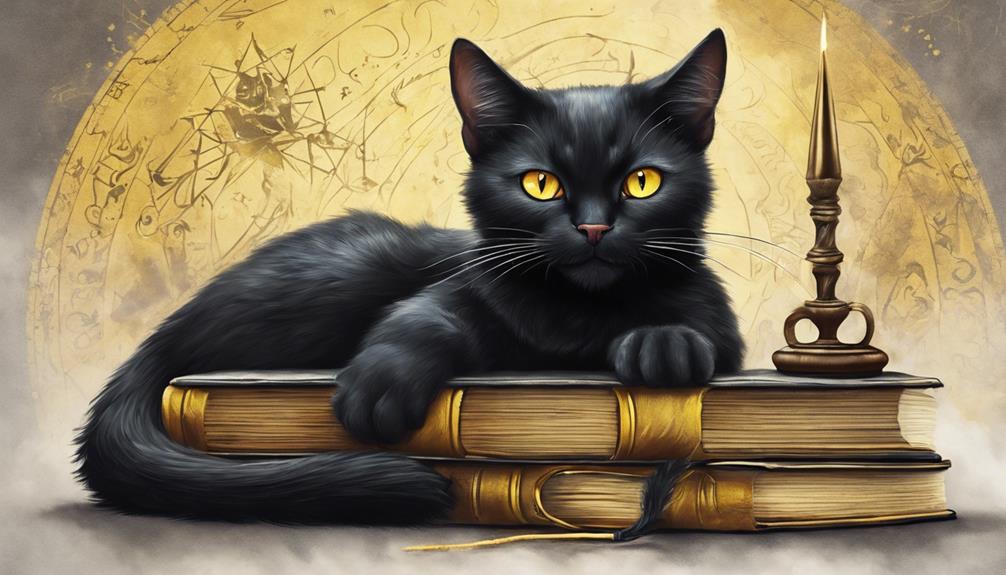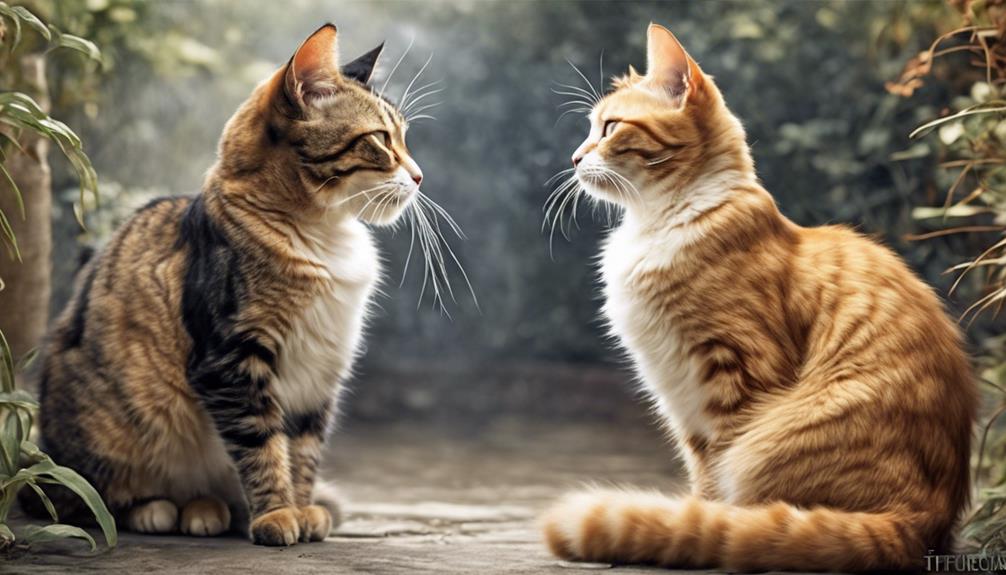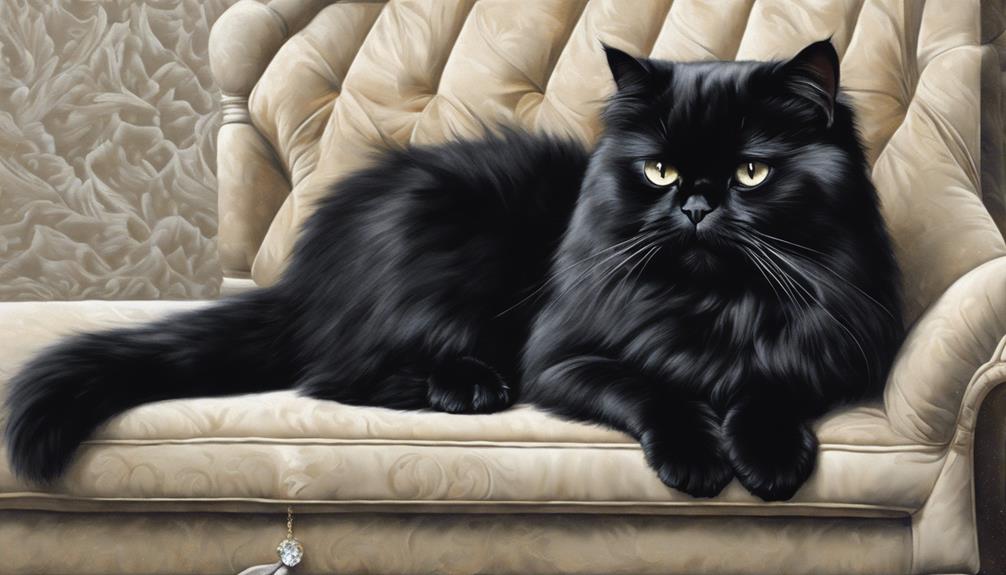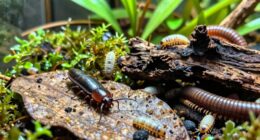When it comes to our furry friends, it is crucial to know which flowers are safe for them. Lilies, amaryllis, daffodils, and tulips are harmful to cats, causing symptoms such as vomiting and kidney damage. Prompt veterinary care is necessary if ingestion is suspected. Prevent toxicity by keeping toxic plants out of reach and using deterrents. Choose cat-friendly plants like Bromeliads and Roses to ensure a safe environment. Create pet-safe floral arrangements using roses and orchids. Remember, prioritizing safety for your feline friends is essential for a happy home. Make wise choices for a blooming safe space. Translated in US English: When it comes to our furry friends, knowing which flowers are safe for them is important. Lilies, amaryllis, daffodils, and tulips are toxic to cats, causing symptoms like vomiting and kidney damage. Quick vet care is essential if ingestion is suspected. Prevent toxicity by keeping toxic plants out of reach and using deterrents. Opt for cat-friendly plants like Bromeliads and Roses to guarantee a safe environment. Create pet-safe floral arrangements with roses and orchids. Remember, safety first for your feline friends is key to a happy home. Choose wisely for a blooming safe space.
Key Takeaways
- Choose cat-safe blooms like roses, orchids, and gerbera daisies.
- Avoid toxic flowers such as lilies, tulips, and daffodils.
- Opt for non-toxic alternatives like sunflowers, zinnias, and African violets.
- Keep flowers out of reach using safe plant stands or hanging planters.
- Educate yourself on toxic plants to ensure feline safety and wellness.
Flowers Toxic to Cats
When it comes to flowers toxic to cats, certain varieties like lilies pose a severe threat to our feline friends due to their potential to cause kidney damage. As much as we adore having vibrant blooms in our homes, it's important to be aware of the dangers certain flowers can pose to our beloved pets. Lilies, including Asiatic, Day, Easter, Japanese Show, and Tiger Lilies, contain toxins that can be extremely harmful if ingested by our curious cats. These beautiful flowers may add charm to our living spaces, but they're definitely not pet-safe flowers.
Being mindful of the potential risks associated with toxic flowers is vital for creating a safe environment for our furry companions. While we may enjoy the beauty and fragrance of various blooms, it's important to prioritize the well-being of our cats by steering clear of flowers like lilies, amaryllis, daffodils, tulips, chrysanthemums, hyacinths, iris, gladioli, and foxglove that can be dangerous if ingested. Let's make sure our homes are filled with not only lovely flowers but also with safety for our cherished feline friends.
Signs of Flower Toxicity in Cats
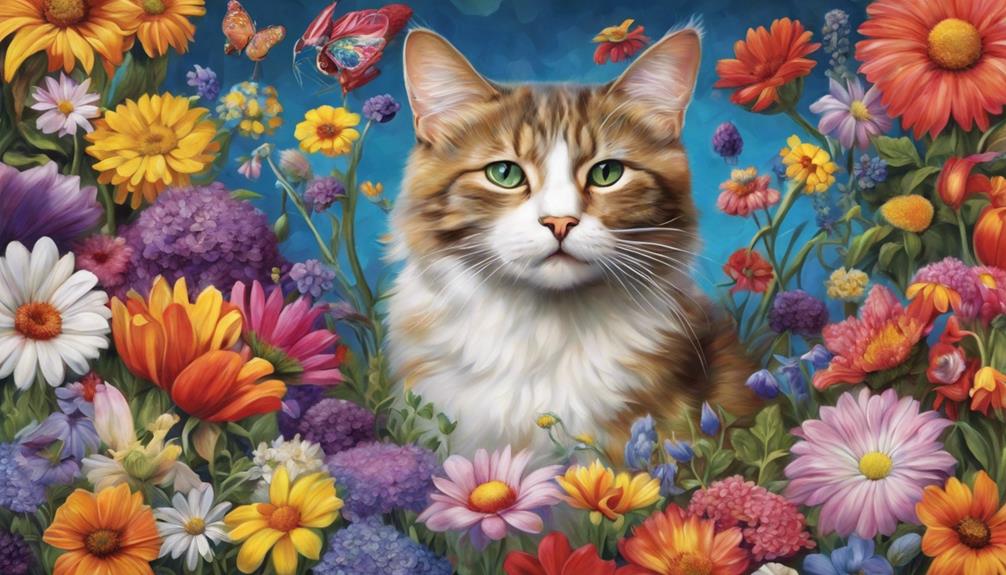
We must be vigilant for any signs of flower toxicity in our cats, as they can manifest as drooling, vomiting, lethargy, seizures, or even kidney damage.
Immediate veterinary attention is vital if we suspect our feline friends have ingested toxic flowers to prevent serious consequences.
Recognizing these warning signs promptly can help safeguard our beloved pets' well-being and guarantee a swift response in emergencies.
Toxicity Warning Signs
Identifying the signs of flower toxicity in cats is vital for ensuring prompt treatment and care. If your feline friend exhibits symptoms like drooling, vomiting, lethargy, seizures, or kidney damage, it could be due to flower toxicity.
Remember, the signs may vary depending on the type of flower ingested. In cases of emergency, urgent vet consultation is essential to address the situation promptly. Some flowers may cause immediate reactions in cats, while others could lead to delayed toxicity symptoms.
Being vigilant and recognizing these warning signs can make a significant difference in your cat's well-being. If you suspect your cat has ingested a toxic flower, don't hesitate to seek professional help to guarantee the best possible outcome for your beloved pet.
Immediate Vet Attention
Recognizing the signs of flower toxicity in cats is vital for ensuring prompt veterinary care and treatment. If your feline friend exhibits symptoms like drooling, vomiting, lethargy, seizures, or kidney damage after potentially ingesting a toxic plant, immediate vet attention is essential. Cats can display immediate or delayed reactions to toxic plants, underscoring the need for urgent veterinary consultation in emergencies. To help you understand the importance of acting swiftly, here is a table summarizing signs that may indicate flower toxicity in cats:
| Sign of Flower Toxicity | Action Needed |
|---|---|
| Drooling | Seek veterinary care |
| Vomiting | Contact a vet immediately |
| Lethargy | Consult a vet promptly |
| Seizures | Immediate veterinary attention |
Importance of Prompt Veterinary Attention
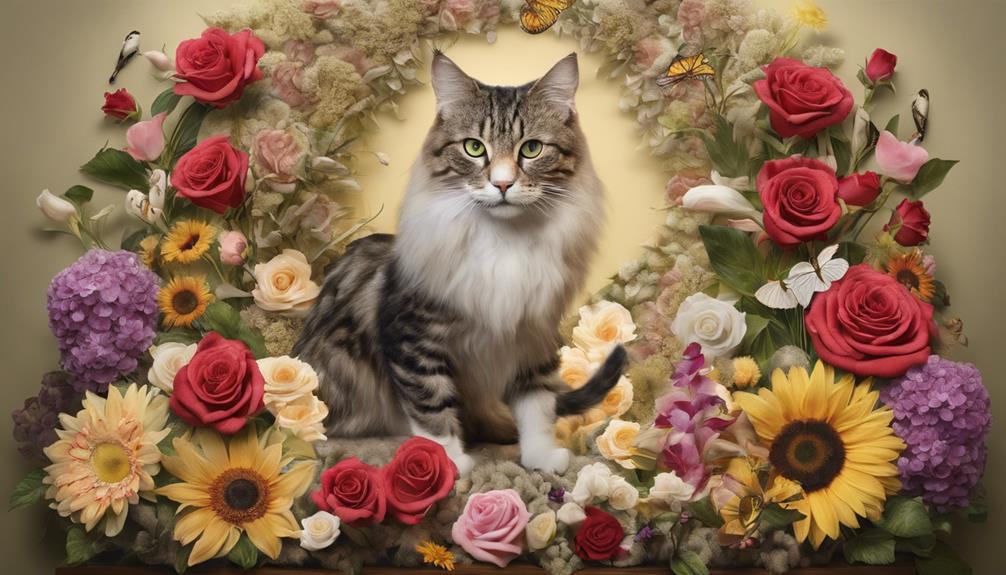
Seeking immediate veterinary care is vital in preventing serious health complications for cats who've ingested toxic flowers. When a feline friend gets into a harmful plant, time is of the essence. Quick veterinary attention can make all the difference in saving your cat's life.
Even if your cat shows no immediate symptoms after nibbling on a toxic flower, it's essential to seek prompt veterinary care. Veterinarians have the expertise to provide specific treatments tailored to the type and severity of flower toxicity. Their interventions can help mitigate the effects of the poisonous plants on your cat's health.
Preventing Cat Exposure to Toxic Plants

When creating a safe environment for cats, it's essential to keep toxic plants out of their reach to prevent accidental ingestion. Consider using hanging planters or placing plants on tall furniture to discourage cats from exploring them.
It's also helpful to train cats to avoid toxic plants through positive reinforcement techniques.
Plant-Safe Home Environment
To maintain the safety of our feline companions, it's crucial to establish a plant-friendly home environment that guarantees cats aren't exposed to toxic plants. Place plants out of reach on high shelves or in hanging planters to prevent cats from accessing toxic flowers.
Utilize deterrents like bitter apple spray on plants to discourage cats from nibbling on them. Research and identify common toxic plants to avoid bringing them into your home environment.
Monitor your cat's behavior around plants and flowers to make sure they don't ingest anything harmful. Additionally, create a safe designated area with cat-friendly plants like cat grass or catnip to satisfy their natural curiosity.
Cat-Friendly Flower Choices
In selecting cat-friendly flower choices, we prioritize safety by opting for plants like Bromeliads, Gerbera Daisies, and Bamboo Palm to prevent potential toxicity.
- Bromeliads: Their vibrant colors add beauty without posing a threat to your curious feline friend.
- Gerbera Daisies: These cheerful blooms aren't only safe for cats but also a delightful addition to your home decor.
- Bamboo Palm: With its air-purifying qualities, this plant not only keeps the air fresh but also keeps your cat safe.
- Roses: A classic choice that's safe for cats, perfect for showing love without compromising on safety.
- Hibiscus: Bring a tropical touch to your space while ensuring your cat's well-being with these colorful flowers.
Toxic Plant Awareness
Raising awareness about toxic plants and their risks to cats is crucial for ensuring their well-being and safety in our homes. Cats, with their curious nature, may come across toxic flowers like lilies, daffodils, and chrysanthemums, leading to severe health issues such as vomiting, lethargy, and kidney damage.
It's important to act promptly by contacting a vet if your feline friend ingests any toxic plants to prevent further complications. Opt for cat-safe bouquet options like gerbera daisies, sunflowers, and bromeliads to adorn your home without risking your pet's health.
Choosing Cat-Safe Blooms
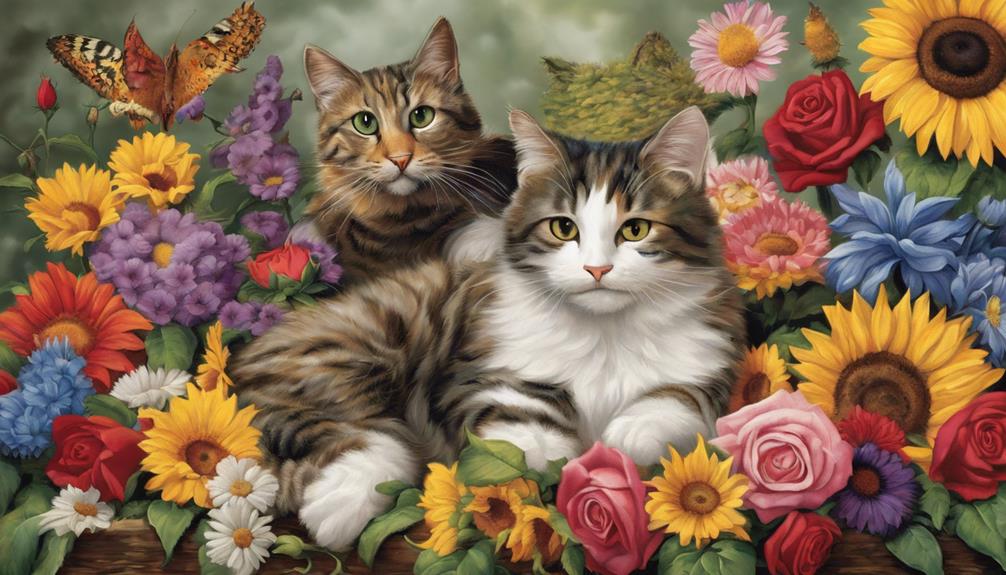
When selecting flowers for your home with cats, it's crucial to choose cat-safe blooms that are non-toxic and pose no harm to your feline companions. Here are some tips to assist you in picking the best blooms for your furry friends:
- Opt for African violets, roses, orchids, and zinnias, as these are non-toxic and safe for cats.
- These flowers not only add vibrant colors to your space but are also low-maintenance, ideal for homes with playful feline friends.
Prioritize your cat's well-being by surrounding them with safe blooms that won't harm them if nibbled on.
- Avoid toxic flowers like lilies, tulips, and daffodils, which can cause serious health issues if ingested by cats.
Recognizing Symptoms of Flower Toxicity
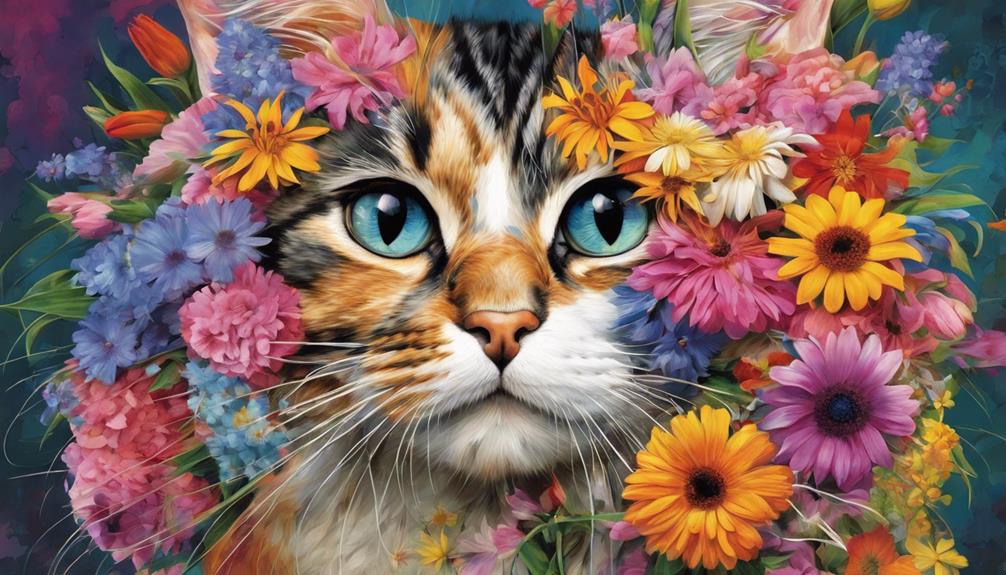
After selecting safe flowers for your cats, it's important to be able to recognize symptoms of flower toxicity to guarantee your feline friends' well-being. Symptoms of flower toxicity in cats can vary from drooling and vomiting to more severe signs like lethargy, seizures, and kidney damage. Whether immediate or delayed, these signs can indicate that your cat has ingested a toxic bloom.
Being vigilant and noticing these symptoms promptly is essential in identifying and addressing potential flower toxicity in your furry companions. If you notice any of these signs, it's necessary to act quickly and seek urgent veterinary consultation. In emergency cases of flower toxicity, contacting an emergency vet is essential for your cat's well-being.
Hazardous Blooms to Avoid

To protect your cats' health, it's crucial to steer clear of hazardous blooms like lilies, amaryllis, daffodils, tulips, chrysanthemums, and hyacinths.
- Lilies, for example, can lead to severe kidney damage in cats if ingested.
- Amaryllis, while beautiful, can cause symptoms like vomiting and lethargy in our feline friends.
- Daffodils may result in drooling and abdominal pain if your cat decides to take a bite.
- Tulips, although lovely, can bring about symptoms such as diarrhea and increased heart rate in cats.
- Chrysanthemums and hyacinths are also on the list of flowers to avoid, as they can cause seizures and skin irritation in our furry companions.
Creating Pet-Friendly Floral Arrangements

Let's make our floral arrangements cat-friendly by choosing safe blooms like roses, orchids, and gerbera daisies. These non-toxic flowers not only brighten up our homes but also keep our feline friends safe and sound.
When creating pet-friendly floral displays, it's important to avoid toxic options such as lilies, tulips, and daffodils that can harm our beloved cats.
Incorporating non-toxic alternatives like sunflowers, zinnias, and African violets guarantees that our floral arrangements aren't only beautiful but also safe for our furry companions. To further protect our pets, it's vital to keep these flowers out of reach of curious cats. Utilizing safe plant stands or hanging planters can help prevent any unwanted interactions between our cats and the flowers.
Cat-Safe Alternatives to Toxic Plants
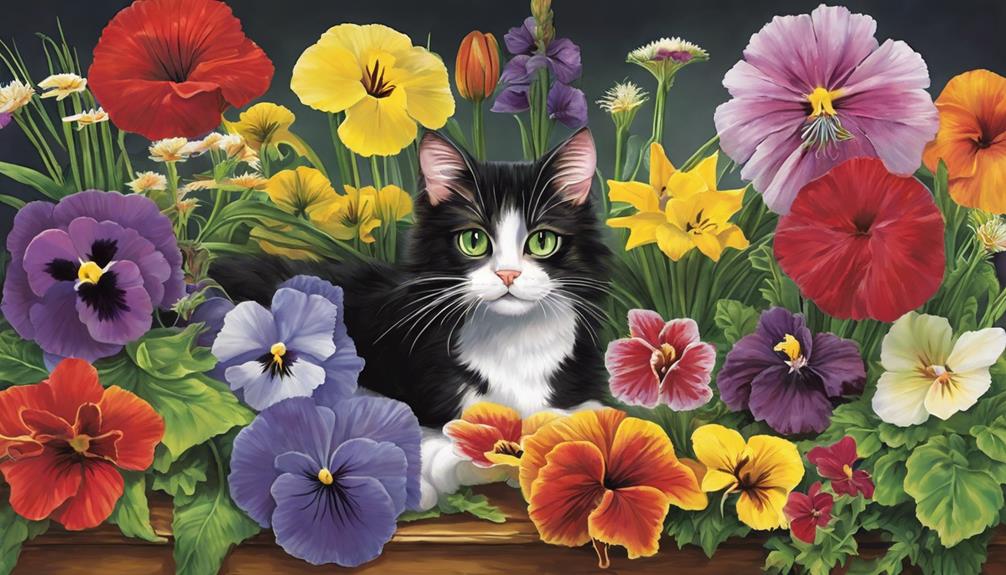
When it comes to keeping our feline friends safe, knowing which plants are toxic is essential. Luckily, there are plenty of cat-friendly flower options that can brighten up our homes without posing any risks to our pets.
Toxic Plants Risks
Exploring cat-safe alternatives to toxic plants reveals numerous non-toxic options that can enhance your feline companion's environment while minimizing health risks. When choosing plants for your home, consider these safe options:
- Bromeliads: These colorful and exotic plants are safe for cats and add a tropical touch to your space.
- Gerbera Daisies: Bright and cheerful, these flowers are a safe choice that won't harm your furry friend.
- Bamboo Palms: Not only are they non-toxic to cats, but they also purify the air, creating a healthier atmosphere.
- Orchids: Elegant and pet-friendly, orchids are a beautiful addition to any cat-friendly home.
- Roses: Classic and romantic, roses are safe for cats and come in various colors to suit your style.
Cat-Friendly Flower Options
When selecting cat-friendly flower options for your home, prioritize safety by choosing non-toxic plants that enhance your space without posing risks to your feline friend.
Think about adding Bromeliads, Gerbera Daisies, and Bamboo Palm to your bouquet choices for a pop of color that won't harm your curious cat.
Majesty Palm, Marigold, and Sunflowers are excellent non-toxic flower options that can brighten up your living space while ensuring your cat's well-being.
For a touch of nature without the worry, Birds Nest Fern, Orchids, and Swedish Ivy are safe plant alternatives to think about.
And if you're looking for more cat-friendly choices, Purple Velvet Plants, Rattlesnake Plants, and Impatiens offer a natural touch without any toxic effects on your beloved pet.
Pet-Safe Gardening Tips
To guarantee the safety and well-being of your feline companion, consider incorporating cat-safe alternatives into your gardening routine, such as cat grass, catnip, mint, or catmint.
- Plant cat grass, catnip, mint, or catmint to fulfill your cat's natural plant-chewing instincts.
- Set up a special cat garden with safe options like spider plants and cat thyme.
- Steer clear of toxic plants like lilies, tulips, and daffodils in your garden.
- Provide vertical climbing structures with cat-friendly plants to keep your pet engaged.
- Keep your cat mentally stimulated with interactive toys to deter them from exploring harmful plants.
Ensuring Feline Well-Being

How can we guarantee the well-being of our feline friends when it comes to choosing flowers for our homes? It's important to prioritize our cats' safety by opting for cat-safe flowers like African violets, asters, and roses. By steering clear of toxic flowers such as lilies, daffodils, tulips, and chrysanthemums, we can create a space that's both beautiful and secure for our furry companions. Pet-friendly options like orchids, zinnias, and sunflowers provide vibrant decoration without posing any risks to our beloved cats.
To ensure a cat-friendly environment, consider selecting non-toxic flowers like roses, marigolds, and impatiens. By researching cat-safe bouquet options and avoiding harmful plants like foxglove and iris, we can actively contribute to our feline friends' well-being. Remember, our cats rely on us to provide a safe and nurturing space, so let's make informed choices when it comes to selecting flowers for our homes.
Toxicity Risks for Cats
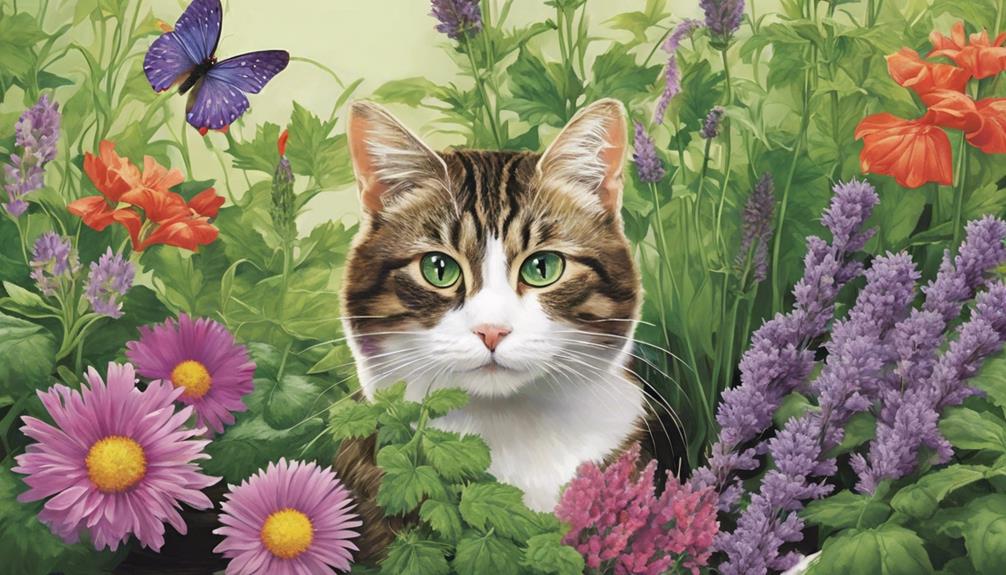
Choosing flowers for your home requires careful consideration to avoid exposing your beloved feline companions to potential toxicity risks. When it comes to keeping your cats safe, here are some essential points to keep in mind:
- Some common flowers like lilies, daffodils, tulips, and chrysanthemums can pose significant toxicity risks for cats.
- Ingesting these toxic flowers can result in symptoms such as vomiting, drooling, lethargy, seizures, and even kidney damage in cats.
It's vital to seek immediate veterinary consultation if you suspect your cat has ingested a toxic flower.
- Opt for cat-safe bouquet options like bromeliads, gerbera daisies, marigolds, sunflowers, orchids, and roses to guarantee a safe environment for your feline friends.
- Preventing cat exposure to toxic flowers and choosing cat-safe plants are fundamental steps in promoting the well-being of your beloved pets.
Emergency Actions for Flower Ingestion

When a cat ingests flowers, contacting the vet immediately is vital for proper guidance and quick action. Providing the vet with details about the ingested flower can aid in accurate treatment.
Vet Consultation Importance
In cases of flower ingestion by cats, immediate vet consultation is essential to prevent serious health issues and guarantee timely intervention for the well-being of the cat. When facing such a situation, here are key reasons why contacting a vet promptly is important:
- Assessment of Toxicity: Vets can determine how harmful the ingested flowers are.
- Treatment Recommendations: They'll suggest the best course of action for the cat's specific situation.
- Monitoring for Adverse Effects: Vets will keep a close eye on the cat's condition for any negative developments.
- Life-Saving Interventions: Quick vet intervention can be crucial in saving the cat's life.
- Ensuring Well-being: Consulting a vet promptly is fundamental for the cat's recovery and overall health.
Immediate Vet Visit
Taking immediate action in response to flower ingestion by cats is vital for ensuring their well-being and health. If your pet ends up ingesting a toxic flower, it's essential to rush them to the vet without delay. Symptoms of flower toxicity can escalate quickly, necessitating emergency treatment.
A prompt vet consultation is necessary to provide the best care and interventions for your furry friend in case of ingestion. Remember, contacting the vet right away can be a life-saving decision for your cat and may prevent severe consequences.
Time is of the essence when it comes to dealing with flower ingestion in pets, so don't hesitate to seek professional help to safeguard your beloved feline companion's health.
Safe Floral Options for Cat Owners

As cat owners, we prioritize the well-being of our feline friends by choosing safe floral options to adorn our homes. When selecting flowers that won't harm our beloved pets, consider these cat-safe options:
- African violets: These vibrant flowers add a pop of color to any room and are safe for curious cats to be around.
- Roses: Classic and elegant, roses are a timeless choice that pose no threat to our furry companions.
- Sunflowers: Bright and cheerful, sunflowers bring a touch of sunshine indoors without risking our cats' health.
- Orchids: Known for their beauty and grace, orchids are a safe and sophisticated floral option for cat owners.
- Zinnias: With their diverse colors and shapes, zinnias are a playful choice that won't harm our feline friends.
Cat-Friendly Flower Selection Guide
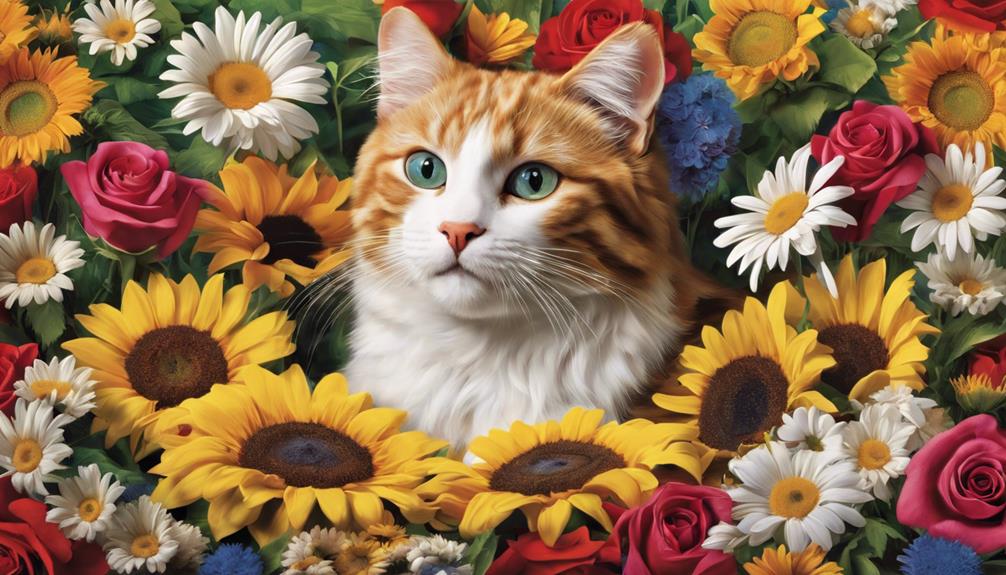
When considering floral options safe for cats, it's crucial to choose varieties like asters, celosia, orchids, roses, sunflowers, and zinnias to guarantee a pet-friendly environment. These cat-safe flowers are non-toxic to cats, ensuring your furry friends can roam freely without the worry of harmful effects. By incorporating these blooms into your home, you not only add a touch of nature but also create a safe haven for your beloved feline companions.
Opting for cat-friendly bouquets not only brightens up your living space but also promotes a healthy atmosphere for your pets to thrive in. It's important to steer clear of toxic flowers like lilies, tulips, daffodils, chrysanthemums, and hyacinths when sharing your home with cats. Making informed choices when selecting flowers showcases your commitment to providing a safe and nurturing environment for your cats. So, next time you arrange a floral display, remember to prioritize cat-safe options to ensure a harmonious coexistence between nature and your furry friends.
Cat Care and Flower Safety
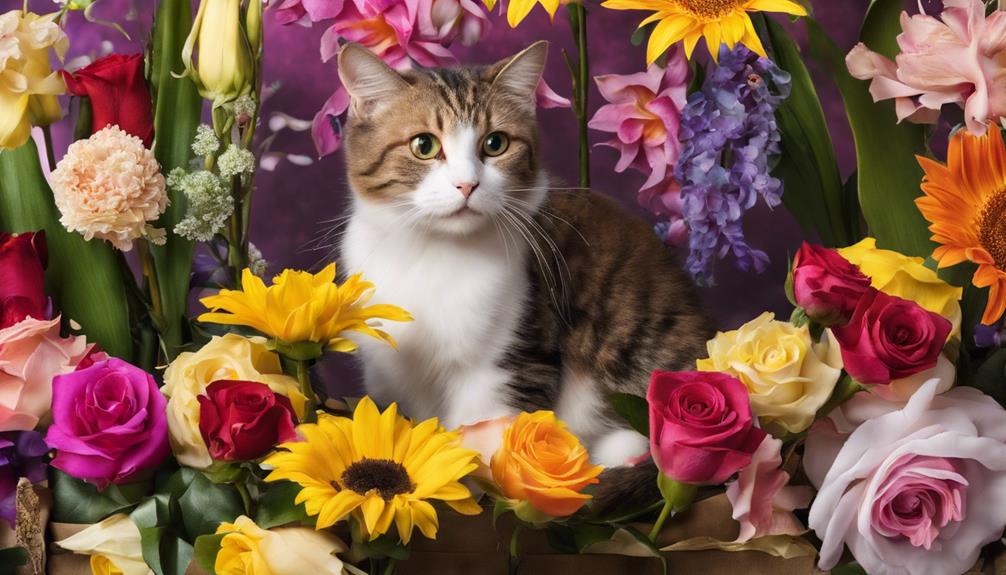
To ensure the well-being of our feline companions, it's vital to understand the importance of cat care and flower safety in our homes. When it comes to keeping our cats safe from toxic flowers, here are some essential tips to keep in mind:
- Know the Culprits: Educate yourself on common toxic flowers like lilies, amaryllis, daffodils, tulips, chrysanthemums, and hyacinths to prevent any accidental ingestion by your curious cat.
- Watch for Signs: Be vigilant for symptoms of flower toxicity in cats such as drooling, vomiting, lethargy, seizures, or kidney damage, and seek immediate veterinary help if you suspect any issues.
- Opt for Cat-Safe Bouquets: Choose cat-friendly blooms like bromeliads, gerbera daisies, orchids, marigolds, sunflowers, and roses to adorn your home without jeopardizing your feline friend's health.
- Prevent Exposure: Keep toxic flowers out of reach and consider placing cat-safe plants in your living spaces to create a safe environment for your beloved pet.
- Prioritize Feline Wellness: By being mindful of flower safety and cat care, you can strengthen the bond with your cat and promote their overall well-being.
Frequently Asked Questions
Can Cats Develop Allergies to Certain Safe Flowers?
Yes, cats can develop allergies to certain safe flowers. It's important to monitor your feline friend for any signs of allergic reactions like sneezing or skin irritation. Consult your vet if you suspect any issues.
Are There Any Non-Toxic Flowers That Are Especially Appealing to Cats and May Attract Them to the Garden or Home?
In our experience, catnip is a magnet for felines. Its allure is like a siren's call, drawing cats with its irresistible scent. Planting catnip in your garden or home can create a playful paradise for your fur babies.
How Can Cat Owners Safely Introduce New Flowers Into Their Environment Without Risking Their Cat's Health?
When introducing new flowers, we make sure they are safe for our cat by researching pet-friendly options. We gradually bring them into our space, observing our cat's reactions. Consulting with a veterinarian helps us guarantee our cat's health and happiness.
Are There Any Natural Remedies or Supplements That Can Help Alleviate Symptoms of Flower Toxicity in Cats Before Seeking Veterinary Attention?
We can try natural remedies like activated charcoal or probiotics to help ease flower toxicity symptoms in our cats. However, if symptoms persist or worsen, it's essential to seek immediate veterinary attention for proper care.
How Can Cat Owners Easily Identify and Differentiate Between Safe and Toxic Flowers When Shopping for Floral Arrangements or Plants for Their Home?
We choose petal-perfect bouquets by glancing at petals. Choosing safe flowers involves consulting lists, like lilies that we avoid, for felines. Identify toxic blooms by referring to guides for assistance. It's crucial for our pets.
Can Black and White Cats Have Adverse Reactions to Certain Flowers?
Some black and white cat breeds may have adverse reactions to certain flowers, such as lilies and daffodils, which can be toxic to cats if ingested. It’s important for pet owners to be aware of the potential dangers and to keep these harmful plants out of reach of their feline friends.
Conclusion
In the blooming garden of cat safety, it's crucial to select flowers wisely to guarantee our furry friends stay healthy and happy.
By avoiding toxic blooms and choosing cat-friendly options, we can establish a sanctuary where our feline companions can play without concern.
Remember, a petal's allure may be irresistible, but a watchful eye and a thoughtful selection of safe flowers will keep our cats purring with delight.


